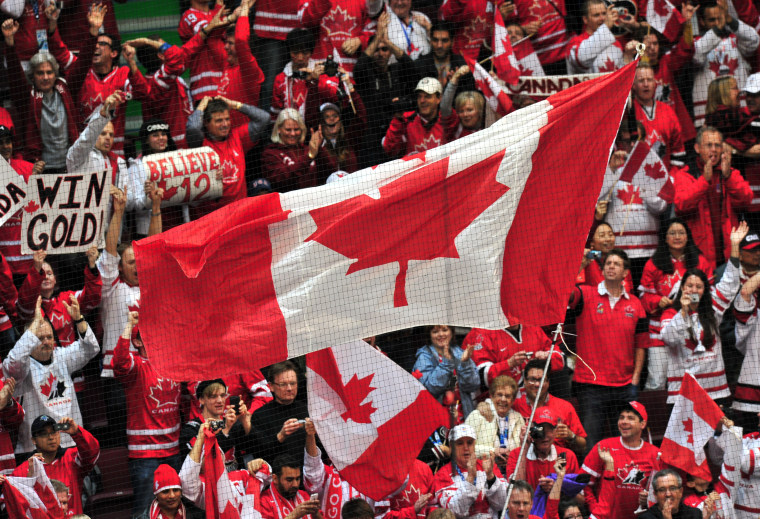With four days left for the unexpected to happen, organizers say the Vancouver Games have recovered from a shaky start and succeeded on many fronts, from combating doping to strengthening Canadian national unity.
Even with the return of rain after a welcome stretch of good weather, leaders of the Vancouver Organizing Committee told a group of reporters Wednesday they were proud of their resiliency in the face of multiple glitches and harsh criticism early in the games.
"We have tried very hard to look at every day through a critical lens," said VANOC's CEO, John Furlong. "If there's the slightest imperfection, we're trying to attack it and make improvements."
The most welcome surprise, Furlong said, has been the enthusiastic response of area residents, who conveyed some ambivalence about hosting the Olympics in pre-games opinion polls. Now, downtown sidewalks and public gathering areas are packed with upbeat crowds, and locals and visitors alike line up for hours to get into prime attractions
"They have chosen not to be spectators," Furlong said of the local populace. "They have chosen to live this with us. ... There's a prevailing atmosphere in the city of trying to help and contribute."
The president of the International Olympic Committee, Jacques Rogge, concurred.
"I have never seen a city embrace the games as Vancouver has done," he said while attending a speedskating event. "What we have seen here in the streets of Vancouver is extraordinary."
Olympic enthusiasm seems to have spread far beyond British Columbia, Furlong said, bringing together at least for now a country challenged by linguistic, ethnic and geographic divides.
The games have been "a nation builder," he said. "I hope we are a stronger Canada."
Certainly, the nation was more cheerful by Wednesday night, when the men's hockey team powered past Russia 7-3 in a quarterfinal, and its women won gold and silver in bobsled, setting off raucous celebrations at both venues. The gold medal was Canada's seventh of the games, tying it for the lead in that category.
Among other accomplishments cited by VANOC leaders:
As of Wednesday, there had been no positive doping results from the hundreds of tests conducted on Olympic athletes.
"We have a state-of-the-art, very sophisticated anti-doping program," said VANOC's vice president for sport, Cathy Priestner Allinger. "It doesn't get better than what we've built here."
An Olympic cauldron on the downtown Vancouver waterfront — the source of criticism last week because it was too inaccessible — has become a photogenic and hugely popular attraction since VANOC arranged to open a nearby rooftop as a public viewing area.
It's an Olympic first, said Furlong. "You can actually feel the heat on your face."
Revenues from sales of tickets and merchandise have exceeded expectations, according to VANOC executive vice president Dave Cobb, helping keep the budget on track and offsetting weather-related losses. Organizers had to cancel thousands of tickets at Cypress Mountain, venue for snowboarding and freestyle skiing, and spend millions of extra dollars to keep the venue operational in the face of prolonged warm, rainy weather.
Cobb said organizers assume that some unexpected challenge will surface in the remaining days of the games.
"We need to be very careful we don't let our guard down and relax," he said.
Both VANOC and the Canadian Olympic Committee headed into the games embracing a prediction that Canada would — for the first time — win the overall medal race on the strength of the $117 million invested in the Own The Podium program. That goal has been abandoned in the face of a powerful performance by the U.S. team, but the Canadians still have a chance to emerge with the most gold medals.
"We'll take it any single way we can," said the Canadian team's chef de mission, Nathalie Lambert. "If at the end of the day it's gold medals, I'm all for it."
Like other Canadian officials, she insisted that Own The Podium already rated as a success, regardless of the medal count.
"The main reason was to raise enough money to support those great athletes and to also use that as a platform to promote amateur sport and inspire Canadians," she said. "Its most important success is the smile of pride and satisfaction and joy that we see more and more every day on our athletes' faces."
That sentiment was echoed by Canadian speedskater Clara Hughes, who won bronze Wednesday in the 5,000 to conclude a 20-year sporting career.
"I don't know what planet you live on, but I have never seen Canadians be so excited," she said.
Priestner Allinger described Own The Podium — and its somewhat un-Canadian prediction — as a learning experience.
"For the Canadian team, what's new for us is going for gold," she said. "We've seen some medals lost because they wanted the gold medal versus a medal."
Furlong said he hoped these Olympics would inspire more Canadian children to engage in sport.
"There couldn't be a better legacy than that one," he said.
